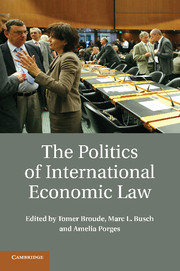Book contents
- Frontmatter
- Contents
- Contributor List
- Acknowledgments
- 1 Introduction
- Part I The Politics of Law Making in International Trade
- 2 The Politics and Indirect Effects of Asymmetrical Bargaining Power in Free Trade Agreements
- 3 The Politics of Linkages in U.S. Preferential Trade Agreements
- 4 The Politics of African Trade Negotiations in the WTO's Doha Round
- 5 The Politics of Legitimacy in the UNCITRAL Working Methods
- Part II The Politics of International Investment Treaty Making
- Part III The Politics of Sovereign Wealth and International Financial Law
- Part IV The Politics of Dispute Settlement in International Economic Law
- Part V Linkages between International Economic Law and Foreign Policy
- Index
5 - The Politics of Legitimacy in the UNCITRAL Working Methods
Published online by Cambridge University Press: 03 May 2011
- Frontmatter
- Contents
- Contributor List
- Acknowledgments
- 1 Introduction
- Part I The Politics of Law Making in International Trade
- 2 The Politics and Indirect Effects of Asymmetrical Bargaining Power in Free Trade Agreements
- 3 The Politics of Linkages in U.S. Preferential Trade Agreements
- 4 The Politics of African Trade Negotiations in the WTO's Doha Round
- 5 The Politics of Legitimacy in the UNCITRAL Working Methods
- Part II The Politics of International Investment Treaty Making
- Part III The Politics of Sovereign Wealth and International Financial Law
- Part IV The Politics of Dispute Settlement in International Economic Law
- Part V Linkages between International Economic Law and Foreign Policy
- Index
Summary
The process of international law-making is, in part, a function of politics. States, and society, assert their interests and values and strive to have them reflected in the resulting substantive law. The ability to control the process of international norm generation – who participates, how decisions are made, and when agendas move forward – is the power to control the substance of international law making. States also use process to generate legitimate norms. Good procedures enable representative, transparent, and effective rules. Whether process serves politics or legitimacy (or both) is not always easy to determine.
This chapter considers a controversy over the methods of work (working methods) at the United Nations Commission on International Trade Law (UNCITRAL) and whether it represents a political struggle or a debate over the best means to achieve more legitimate rules. UNCITRAL develops international norms that affect a variety of trade issues. It has had considerable success. As an organ of the United Nations (UN), it operates under the procedures set forth by the General Assembly. Although it has not adopted its own rules of procedure as have some other UN organs, it has, in practice, developed working methods that are customarily followed and that are currently under debate.
I examine the controversy over UNCITRAL's working methods by using a legitimacy analysis to assess the substantive and political attributes of the proposals under consideration.
- Type
- Chapter
- Information
- The Politics of International Economic Law , pp. 106 - 130Publisher: Cambridge University PressPrint publication year: 2011
- 1
- Cited by



